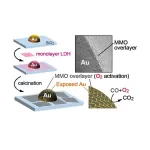(Press-News.org) There are stark differences between European countries when it comes to both the reimbursement of, and access to, new treatments for patients with early-stage lung cancer. There are also differences in reimbursement times and indications between the European Medicines Agency (EMA) and the US Food and Drug Administration (FDA). Researchers from Amsterdam UMC Cancer Center Amsterdam analysed the landscape, and their results are published today in The Lancet Regional Health Europe as part of a series on the latest developments in the treatment of this lung cancer.
"Tackling inequalities in access to care must be a common European priority," says Amsterdam UMC pulmonologist Idris Bahce. In collaboration with colleagues from seven European countries, Bahce used a literature review to map out the latest developments and analyse access to these new treatments from a European perspective.
"The existing differences in healthcare systems and reimbursement structures between European countries threaten to exacerbate healthcare inequalities at both European and national level. We therefore call for a collective European approach to reduce these inequalities," says Bahce.
He suggests measures such as more international cooperation between the EMA and other registration authorities, harmonising cost-effectiveness procedures in European countries, a more critical evaluation of reimbursement criteria and improving multidisciplinary collaborations around the patient.
The standard treatment for fit patients with early-stage lung cancer has always been surgery, sometimes combined with pre- or post-operative chemotherapy. Recently, the EMA has approved new treatments such as immunotherapy, which appear to significantly improve survival rates after surgery. More approvals of innovative treatments are expected, potentially further exacerbating existing inequalities within Europe.
In addition to the Dutch hospitals Amsterdam UMC and Erasmus MC, colleagues from Spain, France, Germany, England, Italy and Poland also contributed to this international study as well as a Review and a Viewpoint in The Lancet Regional Health Europe. Learn more in this video: Advancements in Non-Small Cell Lung Cancer (youtube.com)
END
Improving access to early-stage lung cancer care in Europe
2024-03-04
ELSE PRESS RELEASES FROM THIS DATE:
Low iron levels resulting from infection could be key trigger of long COVID
2024-03-04
Problems with iron levels in the blood and the body’s ability to regulate this important nutrient as a result of SARS-CoV-2 infection could be a key trigger for long COVID, new research has discovered.
The discovery not only points to possible ways to prevent or treat the condition, but could help explain why symptoms similar to those of long COVID are also commonly seen in a number of post-viral conditions and chronic inflammation.
Although estimates are highly variable, as many as three in 10 people infected with SARS-CoV-2 could go on to develop long COVID, with symptoms including fatigue, ...
Swapping meat for Quorn lowers bad cholesterol by 10-percent
2024-03-04
Regularly substituting meat for mycoprotein such as Quorn could help to lower bad cholesterol by 10-percent, which is comparable to switching to a Mediterranean or vegan diet.
New research by the University of Exeter, published in Clinical Nutrition, also found substituting meat for Quorn reduces blood glucose and c-peptide concentrations associated with diabetes, cardiovascular disease and all-cause mortality.
With one in six UK adults suffering from raised cholesterol, the findings indicate that mycoprotein - the high protein, high-fibre food source that’s the main ingredient in Quorn - could play a key role in ...
We must stop technology-driven AI and focus on human impact first, global experts warn
2024-03-04
We need to stop designing new AI technology just because we can, causing people to adapt practices, habits and laws to fit the new technology; instead we need to design AI that fits exactly with what we need, according to human-centred AI advocates.
Fifty experts from around the world have contributed research papers to a new book on how to make AI more ‘human-centred,’ exploring the risks — and missed opportunities — of not using this approach and practical ways to implement it.
The experts come from over 12 countries, including Canada, France, Italy, Japan, New Zealand and the UK, and more ...
NCI-MATCH cancer trial discovers a potentially broader role for an established dual HER2-blocking treatment
2024-03-04
An important discovery from the NCI-MATCH precision medicine initiative is being published today in Clinical Cancer Research, a journal of the American Association for Cancer Research. Trastuzumab-pertuzumab, a drug combination approved by the US Food and Drug Administration (FDA) to treat patients with human epidermal growth factor receptor 2 (HER2)-positive breast cancer, shrunk tumors in patients with several other types of cancer with high levels of the HER2 gene. NCI-MATCH (Molecular Analysis for Therapy Choice) is one of the first ...
Obesity a risk factor for stillbirth, especially at term
2024-03-04
Obesity is a risk factor for stillbirth, and the risk increases as pregnancy advances to term, according to a large study published in CMAJ (Canadian Medical Association Journal) https://www.cmaj.ca/lookup/doi/10.1503/cmaj.221450.
The overall risk of stillbirth in pregnancy is approximately 0.4% in Canada. "Our findings suggest that an earlier delivery date may help reduce the risk of stillbirth for pregnant people with obesity," says lead author Dr. Naila Ramji, a high-risk pregnancy specialist in Fredericton, New Brunswick, and ...
Pioneering research reveals empathetic communication can help overcome vaccine hesitancy
2024-03-04
An international study has shown for the first time how empathetic correction of misinformation among vaccine-hesitant patients can significantly improve attitudes towards vaccination – and potentially boost vaccine uptake.
The research, led by the University of Bristol, also found this new style of communication could help build and maintain a positive relationship with health professionals, increasing trust and public confidence. With the UK currently facing a growing measles outbreak, fuelled by declining rates of the Measles, ...
Rare astrolabe discovery reveals Islamic – Jewish scientific exchange
2024-03-04
The identification of an eleventh century Islamic astrolabe bearing both Arabic and Hebrew inscriptions makes it one of the oldest examples ever discovered and one of only a handful known in the world. The astronomical instrument was adapted, translated and corrected for centuries by Muslim, Jewish and Christian users in Spain, North Africa and Italy.
Dr Federica Gigante, from Cambridge University’s History Faculty, made the discoveries in a museum in Verona, Italy, and published them today in the journal Nuncius.
Dr Gigante first came across a newly-uploaded ...
Sleep apnea symptoms linked to memory and thinking problems
2024-03-03
EMBARGOED FOR RELEASE UNTIL 4 P.M. ET, SUNDAY, MARCH 3, 2024
MINNEAPOLIS – People who experience sleep apnea may be more likely to also have memory or thinking problems, according to a preliminary study released today, March 3, 2024, that will be presented at the American Academy of Neurology’s 76th Annual Meeting taking place April 13–18, 2024, in person in Denver and online. The study shows a positive association but did not determine whether sleep apnea causes cognitive decline.
Sleep ...
Nanoscale topcoat can turbocharge supported gold nanoparticle catalysts
2024-03-02
Tokyo, Japan – Researchers from Tokyo Metropolitan University have developed a way to add single nanosheets of mixed metal oxide to gold nanoparticles supported on silica to enhance their catalytic activity. Converting carbon monoxide to carbon dioxide, they found that the temperature required for the reaction was greatly reduced, with significant improvements over existing methods for coating gold/silica structures. The method paves the way for the development of a wide range of new high-performance catalysts.
Gold nanoparticles, particles less than five nanometers in diameter, are known to be excellent catalysts ...
Beyond the ink: Painting with physics
2024-03-02
Falling from the tip of a brush suspended in mid-air, an ink droplet touches a painted surface and blossoms into a masterpiece of ever-changing beauty. It weaves a tapestry of intricate, evolving patterns. Some of them resemble branching snowflakes, thunderbolts or neurons, whispering the unique expression of the artist's vision.
Okinawa Institute of Science and Technology (OIST) researchers set out to analyse the physical principles of this fascinating technique, known as dendritic painting. They took inspiration from the artwork ...



